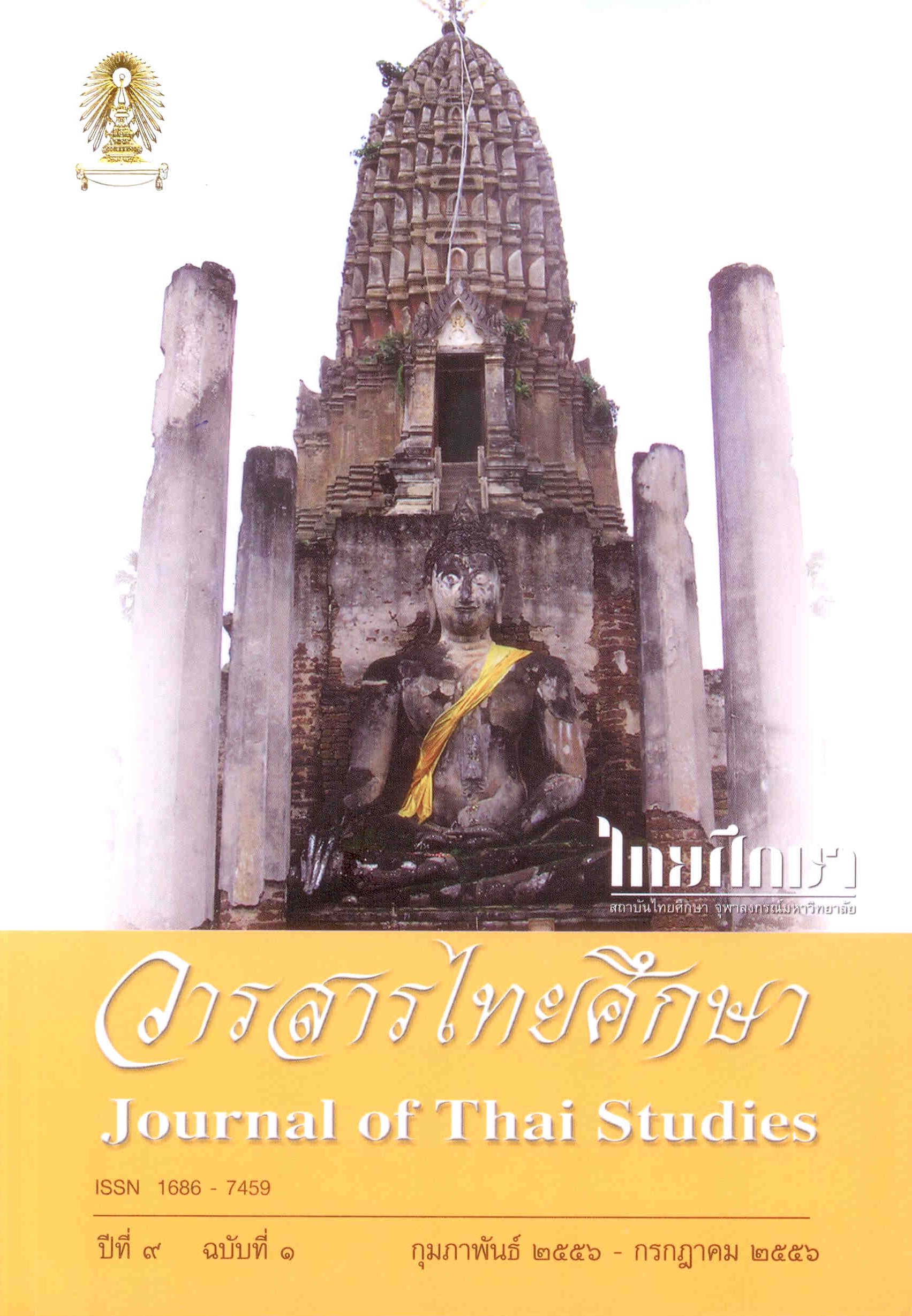King, Officials and People: Perspectives on the First Royal Private Tour Of King Chulalongkorn
Main Article Content
Abstract
The perception about the king, nobility and the people through the first royal private (incognito) tour of King Chulalongkorn (14 July- 7 September 1904) rested on divergent patterns of “behaviour” and “functioning” accompanying the three different statuses. The king, the leader of the country, behaved in the same manner as the commoner in order that he could be able to “perceive” the livelihood of his subjects as it really was by first hand experience rather than only to have it reported by aristocrats. At the same time the trip was also to observe and evaluate the outcomes of his previous regional administrative reform, as well as a tryout of the modern communications system he had just constituted. By the same token, the officials who accompanied the tour, were the ones who played enormously important administrative roles in the newly founded modern administrative system. Along the course of the tour, these powerful aristocrats could develop their understanding and could get close to the commoners. As a result, they could make an appropriate adjustment to the functions under their responsibilities, which were important parts of the progressive reforms of Thailand under King Chulalongkorn’s direction at the time. As for the people, they could be able to meet the king in private and be able to convey to him their personality, happiness and sorrow, in a straight forward way without their acknowledgement that the man, with whom they had meals and close conversations, was their sovereign lord of life and land. The behavioural conduct according to such statuses reflected a beautiful relationship between the king, state officials and the commoners. It was “love, indulgence, and kindness”, which the king showed towards his subjects, both the officials and the commoners alike, in the same manner as “a father behaves with his own children”. At the same time, the bureaucrats, who had the utmost loyalty wholeheartedly to the king, eagerly administered the country for the benefits of the people as their service to the king and the country. As for the commoners, they already had their abstract loyalty to the king according to the absolute monarchy governance. The first royal private tour opened to them opportunities to realize the love, indulgence, and kindness of their king in concrete terms and, therefore, brought to them the multiplied feeling of appreciation and gratefulness to the king. This led to the offering to King Chulalongkorn, “the Great Beloved King”, who has been highly worshiped by all groups of the Thai until the present.
Downloads
Article Details

This work is licensed under a Creative Commons Attribution-NonCommercial-NoDerivatives 4.0 International License.
Journal of Thai studies is licensed under a Creative Commons Attribution-Noncommercial-NoDerivatives4.0 Intenational (CC BY-NC-ND 4.0) licence, unless otherwise stated. Plese read our Policies page for more information on Open Access, copyright and permissions.
References
จุลจอมเกล้าเจ้าอยู่หัว, พระบาทสมเด็จพระ. พระราชดำรัสในพระบาทสมเด็จพระจุลจอมเกล้าเจ้าอยู่หัว ทรงแถลงพระบรมราชาธิบาย แก้ไขการปกครองแผ่นดินฯ. พระนคร: โรงพิมพ์พระจันทร์; ๒๔๙๓.
______. ลิลิตนิทราชาคริต: พระราชนิพนธ์ในพระบาทสมเด็จพระจุลจอมเกล้าเจ้าอยู่หัว. พระนคร: ไทยวัฒนาพาณิช; ๒๔๙๑.
ดำรงราชานุภาพ, สมเด็จฯ กรมพระยา. ความทรงจำ. กรุงเทพมหานคร: ศิลปบรรณาคาร; ๒๕๑๖.
______. จดหมายเหตุเรื่องประพาสต้นในรัชกาลที่ ๕ (เสด็จประพาสต้น รศ.๑๒๓) ใน เสด็จประพาสต้น. เชียงใหม่: บริษัทสันติภาพแพ็คพริ้นท์จำกัด; ๒๕๕๒.
______. นิทานโบราณคดี. หนังสืออนุสรณ์ในการเสด็จพระราชดำเนินพระราชทานเพลิงศพ นางมัณฑนา ดิศกุล ณ อยุธยา. กรุงเทพมหานคร: พิพิธภัณฑ์วังวรดิศและหอสมุดดำรงราชานุภาพ; ๒๕๑๕.
______. ประวัติบุคคลสำคัญฉบับสมบูรณ์. กรุงเทพมหานคร: คลังวิทยา; ๒๕๐๕.
ทองต่อ กล้วยไม้ ณ อยุธยา. แผ่นดินพระจุลจอมเกล้าฯ. กรุงเทพมหานคร: บรรณกิจ ๑๙๙๑; ๒๕๕๒.
______. พระราชาผู้เป็นที่รักของประชาชน. กรุงเทพมหานคร: โรงพิมพ์เพชรสยามการพิมพ์; ๒๕๒๙.
______. เสด็จประพาสต้นในรัชกาลที่ ๕. กรุงเทพมหานคร: โรงพิมพ์และทำปกเจริญผล; ๒๕๒๐.
เธียรดนัย เสริมบุญไพศาล. “การเสด็จประพาสต้น: พระมหากรุณาธิคุณสู่ปวงประชา” เรียงความทุนรางวัลภูมิพล ประจำปี ๒๕๕๒ (ยังไม่ได้พิมพ์เผยแพร่).
ปกรัฐ กนกธนาพร. “การเสด็จประพาสต้น: พระมหากรุณาธิคุณสู่ปวงประชา” เรียงความทุนรางวัลภูมิพล ประจำปี ๒๕๕๒ (ยังไม่ได้พิมพ์เผยแพร่).
ประยุทธ สิทธิพันธ์. ประวัติศาสตร์ประพาสต้น. กรุงเทพมหานคร : โรงพิมพ์บำรุงนุกูลกิจ; ๒๕๒๔.
ปิยนาถ บุนนาค. พระบาทสมเด็จพระจุลจอมเกล้าเจ้าอยู่หัว: ปิยมหาราชผู้ทรงวางรากฐานระบบราชการไทยและปฏิรูปประเทศแบบ “พลิกแผ่นดิน”. ใน: สำนักงานคณะกรรมการพัฒนาระบบราชการ: ๙ แผ่นดินของการปฏิรูประบบราชการ. กรุงเทพมหานคร: บริษัท วิชั่น พริ้น แอนด์ มิเดียร์ จำกัด; ๒๕๕๐.
______. “ชุมชนกับทรัพยากรน้ำในวิถีไทย: มุมมองผ่านการเสด็จประพาสต้น” เอกสารประกอบการบรรยาย ณ สถาบันวิจัยสังคม จุฬาลงกรณ์มหาวิทยาลัย วันพฤหัสบดีที่ ๒๒ กรกฎาคม ๒๕๕๓.
______. ประวัติศาสตร์ไทยสมัยใหม่ (ตั้งแต่การทำสนธิสัญญาบาวริง ถึง “เหตุการณ์ ๑๔ ตุลาคม” พ.ศ.๒๕๑๖) ฉบับพิมพ์ครั้งที่ ๓. กรุงเทพมหานคร: โครงการเผยแพร่ผลงานวิชาการ คณะอักษรศาสตร์ จุฬาลงกรณ์มหาวิทยาลัย; ๒๕๕๓.
พูนพิศมัย ดิศกุล, หม่อมเจ้าหญิง. สิ่งที่ข้าพเจ้าพบเห็น. กรุงเทพมหานคร: นิตยสารคลังสมอง, ๒๕๓๔.
ราชบัณฑิตยสถาน. พจนานุกรมฉบับราชบัณฑิตยสถาน พ.ศ. ๒๕๔๒. กรุงเทพมหานคร: นานมีบุ๊คส์พับลิเคชั่นส์; ๒๕๔๖.
เสด็จประพาสต้น สารคดีโทรทัศน์เฉลิมพระเกียรติพระบาทสมเด็จพระจุลจอมเกล้าเจ้าอยู่หัว. กรุงเทพมหานคร: สันติภาพแพ็คพริ้นท์, ๒๕๕๒.
หนังสือพิมพ์บางกอกไตมส์. ฉบับวันศุกร์ที่ ๒๒ กรกฎาคม พ.ศ.๒๔๔๗.


